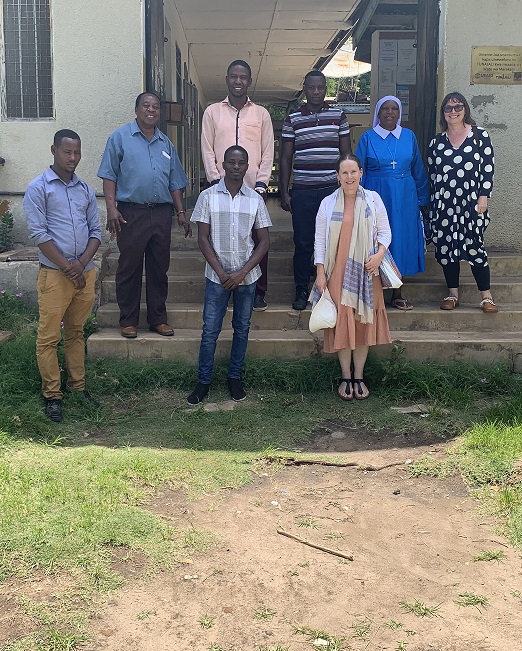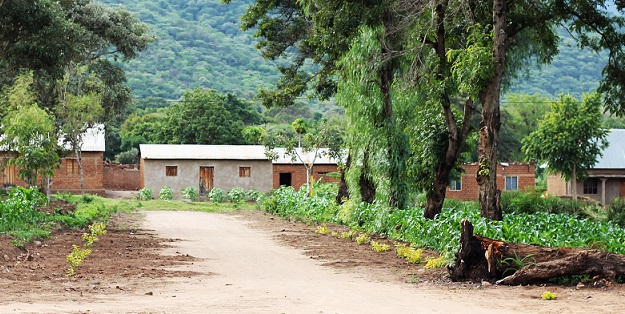Global
Copyright@ Australian Catholic University 1998-2026 | ABN 15 050 192 660 CRICOS registered provider: 00004G | PRV12008
Copyright@ Australian Catholic University 1998-2026 | ABN 15 050 192 660 CRICOS registered provider: 00004G | PRV12008

Itololo Hospital and Community Health Centre has a walk-in cupboard that’s frequented regularly by the facility’s 27 nurses and doctors. The cupboard’s expansive floor-to-ceiling shelves don’t house food, machines, or medicine. Instead, they hold thousands of physical medical records, squeezed tightly inside thin cardboard folios.
Accessing a patient’s physical medical records in such a dense space is time consuming, but at Itololo, it’s the only option.
Located a nine-hour drive from Kilimanjaro Airport, Tanzania, Itololo is nestled between dangerous roads that are often closed in the rainy season, and farming land that’s tended mostly by the nation’s poor, predominantly Muslim families.
The hospital’s remote location is emphasised by its lack of technology – there is just one computer connected to the internet using a Wi-Fi dongle, but it’s slow and rarely used. It’s not that there is a resistance to technology, but rather, the costs outweigh the short-term benefits.
Which explains why nurses and doctors at Itololo rely on physical medical records, and why they also have little connection with their counterparts at other Tanzanian hospitals, or beyond.
So how do you connect a remote health facility, servicing 9,000 impoverished locals, to the rest of the world?
It’s a question three experts from Australian Catholic University (ACU) re attempting to answer.
In early 2023, ACU academics Professor Elspeth Froude, Adjunct Professor Sara Bayes and Dr Bill Sultmann boarded a plane to Kilimanjaro airport, before jumping into a Toyota Landcruiser on a wild drive through Tanzania’s Kondoa region. There, Itololo’s Administrator, Tanzanian-born priest Fr Priscus Massawe CP, was patiently waiting.
Dr Sultmann attempts to describe the rough conditions of roads in the Kondoa region.
“Think of nine hours in a Landcruiser, and the last 10 kilometres taking two hours. So you know, up and down, over an out, type of place,” Dr Sultmann said.
“It looks fairly close on paper, but it’s probably 350km or about to get there and that’s if the roads are open and the vehicles are working. So, it is remote.”
Before taking over as administrator of Itololo, Fr Priscus was sent to live in Melbourne for two years to improve his English and business administration skills. He is a member of the international Congregation of the Passion of Jesus Christs, or simply the Passionists.
In 2021, the Passionists in Australia established a new foundation to oversee international projects in developing countries, appointing Dr Sultmann as its chair. At the time, Fr Priscus was already heading up Itololo, attempting to solve one of Tanzania’s greatest health challenges – preventing the deaths of mothers and their babies, including unborn children, from dying during childbirth.
Fr Priscus sought help from A Passionist Heart Foundation, who responded with open arms, establishing a fundraising project on behalf of Itololo.
As chair of APHF, and Deputy Dean of ACU’s La Salle Academy, Dr Sultmann was convinced that the best way to support Itololo was “to actually be on the ground”.
“You can only do so much remotely, and particularly very remotely where Itololo is concerned,” Dr Sultmann said.

“The idea was to literally go and see.”
Dr Sultmann brought in his ACU colleagues, allied health expert Professor Froude, and midwifery expert Adjunct Professor Bayes on the far-flung journey.
For Professor Froude, the dichotomy around the intense poverty faced by the people of the Kondoa region, and the quality of care performed by the doctors and nurses, was surprising.
“It was just an incredible experience and the real lesson was the importance of us physically being there,” Professor Froude said.
“We had assumptions about what we would find and what we would need to do for support, but it actually looked quite different by the end of our time there.
“The needs really evolved through conversations, a beautiful interaction with the whole of their team, with Fr Priscus, with us having a better understanding of the physical context and the social context, which would never have been able to happen even on a Teams call.”
As the visiting maternity expert, Adjunct Professor Bayes has done similar work in other African counties. She believes the group’s strength-based lens will provide the most practical and effective support.
“It was really, really encouraging, and I wasn't surprised, that the commitments and the professionalism of the staff that we met, and the engagement of the community, actually tells us the service is well used and because they're well trained, they're committed,” Adjunct Professor Bayes said.
“They're person centered and they try and do best practice, but they are remote, they need help to connect with other communities to learn and develop together.”
With the insights brought back by Dr Sultmann, Professor Froude, and Adjunct Professor Bayes, ACU and A Passionist Heart Foundation is hoping to provide ongoing professional development to enhance the level of care at Itololo.
The priority is to purchase an Internet subscription for the hospital staff, so that professional development opportunities led by ACU staff in Australia can be delivered virtually.
Professor Froude said resourcing the hospital with workable technology would connect them with the world but warned against mass donations of unwanted goods.
“There is often a situation, with goodwill behind it, of people donating old computers or old wheelchairs and actually it causes more bother than help,” she said.
“We didn't want to put them in that situation where donations end up sitting on the shelf because it's not functioning properly for their needs.
“Technology could be quite transformative at Itololo, to open up access to the wider community, but it can't be piecemeal.”
Learn more about A Passionist Heart Foundation’s project for Itololo Hospital and Community Health Centre.
Discover how studying at ACU can impact people experiencing disadvantage.
Copyright@ Australian Catholic University 1998-2026 | ABN 15 050 192 660 CRICOS registered provider: 00004G | PRV12008